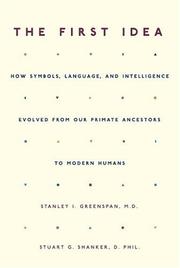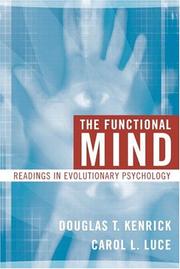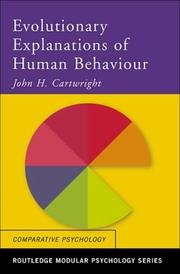| Listing 1 - 10 of 701 | << page >> |
Sort by
|

ISBN: 0738206806 9780738206806 Year: 2004 Publisher: Cambridge (Mass.) Da Capo
Abstract | Keywords | Export | Availability | Bookmark
 Loading...
Loading...Choose an application
- Reference Manager
- EndNote
- RefWorks (Direct export to RefWorks)
In the childhood of every human being, and at the dawn of human history, there is an amazing - and until now unexplained - leap from simple, genetically programmed behavior to symbolic thinking, language, and culture. In The First Idea, Stanley Greenspan and Stuart Shanker explore this missing link and offer new insights into two longstanding questions: how human beings first created symbols and how these abilities initially evolved and were subsequently transmitted and transformed across generations over millions of years." "Drawing on evidence - not only from their research and collaborations comparing the language and intelligence of human infants and apes, but also from the fossil record, neuroscience, and Greenspan's extensive work with children with autism - Greenspan and Shanker offer a radical new direction for evolutionary theory, developmental psychology, and philosophy.

ISBN: 0205344097 Year: 2004 Publisher: Boston (Mass.) : Pearson/Allyn and Bacon,
Abstract | Keywords | Export | Availability | Bookmark
 Loading...
Loading...Choose an application
- Reference Manager
- EndNote
- RefWorks (Direct export to RefWorks)

ISBN: 9780805859577 0805859578 9780805859560 080585956X Year: 2008 Publisher: New York : Lawrence Erlbaum Associates/Taylor & Francis Group,
Abstract | Keywords | Export | Availability | Bookmark
 Loading...
Loading...Choose an application
- Reference Manager
- EndNote
- RefWorks (Direct export to RefWorks)
Book
ISBN: 2738139132 2738139124 Year: 2019 Publisher: Paris : Odile Jacob,
Abstract | Keywords | Export | Availability | Bookmark
 Loading...
Loading...Choose an application
- Reference Manager
- EndNote
- RefWorks (Direct export to RefWorks)
« Fruits de l'évolution et de la sélection naturelle, nous avons gardé certains comportements et modes de pensée anciens, remontant à la préhistoire. Ils induisent des biais cognitifs qui peuvent encore avoir leur utilité - il vaut mieux prendre un bâton tordu pour un serpent que l'inverse -, mais ils viennent aussi fausser nos décisions quotidiennes, ou nous conduire à attribuer aux autres des pensées qu'ils n'ont pas. Les capacités cognitives de l'homme de Cro-Magnon, qui lui ont permis de constituer de grands groupes sociaux, nous ont menés à perfectionner nos capacités de coopération ... mais aussi de dissimulation et de tromperie. Introduction ludique à la psychologie évolutionniste, ce livre montre le face-à-face déroutant entre un "vieux" cerveau et une réalité en partie immuable mais souvent renouvelée. Appréhender les biais de notre psychologie est sans doute un atout pour se connaître et comprendre les autres. »-- 4ème de couverture.

ISBN: 1402072791 Year: 2003 Publisher: Boston Kluwer Academic
Abstract | Keywords | Export | Availability | Bookmark
 Loading...
Loading...Choose an application
- Reference Manager
- EndNote
- RefWorks (Direct export to RefWorks)

ISBN: 0415241480 Year: 2001 Publisher: London Routledge
Abstract | Keywords | Export | Availability | Bookmark
 Loading...
Loading...Choose an application
- Reference Manager
- EndNote
- RefWorks (Direct export to RefWorks)
Book
ISBN: 1446242625 1446214869 1446257746 1283288788 9786613288783 1446203166 Year: 2009 Publisher: Los Angeles, [Calif.] ; London : SAGE,
Abstract | Keywords | Export | Availability | Bookmark
 Loading...
Loading...Choose an application
- Reference Manager
- EndNote
- RefWorks (Direct export to RefWorks)
This work introduces students to the core theories, approaches and findings that are the necessary foundations for developing an understanding of evolutionary psychology. It looks at how the theory is applied and covers evolutionary accounts of abnormal behaviour, language and culture.
Book
Year: 1895 Publisher: New York : Swan Sonnenschein & Co,
Abstract | Keywords | Export | Availability | Bookmark
 Loading...
Loading...Choose an application
- Reference Manager
- EndNote
- RefWorks (Direct export to RefWorks)
This work does not profess to be a treatise on the subject of feeling, but merely a series of studies, and rather tentative ones at that. I have attempted to deduce from the standpoint of biologic evolution the origin and development of feeling, and then to consider how far introspection confirms these results. I am well aware that I traverse moot points-what points in psychology are not moot?-and I trust that the position taken will receive thorough criticism. I should be very glad to have new facts adduced, whatever way they may bear. I have no theory to defend, but the results offered are simply the best interpretation I have as yet been able to attain. (PsycINFO Database Record (c) 2016 APA, all rights reserved).

ISBN: 0805849467 1410609898 9781410609892 0805843779 9780805843774 9780805849462 9781135629182 1135629188 9781135629137 1135629137 9781135629175 113562917X 1282321137 9786612321139 9781282321137 661232113X Year: 2004 Publisher: Mahwah, N.J. Lawrence Erlbaum Associates
Abstract | Keywords | Export | Availability | Bookmark
 Loading...
Loading...Choose an application
- Reference Manager
- EndNote
- RefWorks (Direct export to RefWorks)
During the last 15 years, human sociobiology has metamorphosed into evolutionary psychology. It is concerned with the social problems and stresses hominid and primate ancestors encountered, the psychological mechanisms natural selection shaped to deal with these stresses, and the way those ancient mechanisms work now. Evolutionary psychologists are making great progress in expanding the understanding of human nature, however, this knowledge has had little impact on policymakers and legislators. Supreme Court justices and managers seldom consult evolutionary psychologists to help with their del
Evolutionary psychology --- Psychology --- Human evolution --- Evolutionary psychology.
Book
ISBN: 9781107053687 1107053684 9781107661417 1107661412 1107283957 1108505805 110851474X 9781107283954 Year: 2018 Publisher: Cambridge Cambridge University Press
Abstract | Keywords | Export | Availability | Bookmark
 Loading...
Loading...Choose an application
- Reference Manager
- EndNote
- RefWorks (Direct export to RefWorks)
The nature/nurture question is an age-old problem. 'Beyond Evolutionary Psychology' deals with the relation between culture, evolution, psychology and emotion, based both in the underlying biology, determined by our evolutionary heritage, and in the interaction of our brain with the physical, ecological and social environment, based in the key property of brain plasticity. Ellis and Solms show how the brain structures that underlie cognition and behaviour relate to each other through developmental processes guided by primary emotional systems. This makes very clear which brain modules are innate or 'hard-wired', and which are 'soft-wired' or determined through environmental interactions. The key finding is that there can be no innate cognitive modules in the neocortex, as this is not possible on both developmental and genetic grounds; in particular there can be no innate language acquisition device. This is essential reading for students and scholars of evolutionary psychology and evolutionary biology--
Evolutionary psychology. --- Evolutionary psychology. --- Neuropsychologie. --- Neuropsychology. --- Neuropsychology.
| Listing 1 - 10 of 701 | << page >> |
Sort by
|

 Search
Search Feedback
Feedback About UniCat
About UniCat  Help
Help News
News